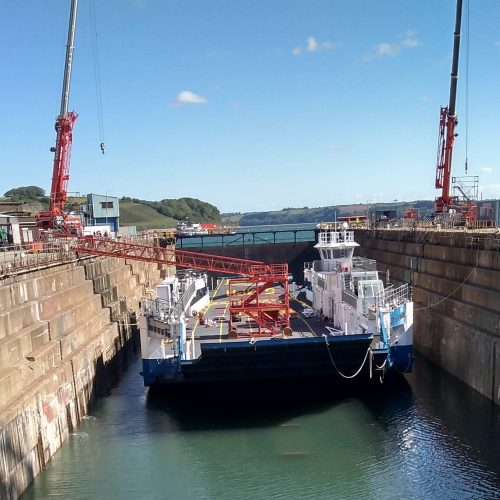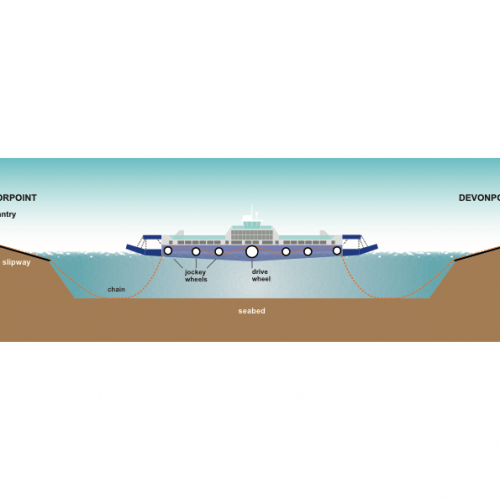A huge thank you to everyone who has been following the Government advice on avoiding all non-essential travel during the coronavirus pandemic. This has helped us to manage the demand for ferry crossings by key workers, emergency services and those travelling for essential reasons while running a two-ferry service.
LYNHER’s refit at A&P’s dry dock facilities in Falmouth is progressing well and is currently due to be completed this weekend. This is just 13 days later than the original scheduled completion date which is a great achievement in the light of the COVID -19 constraints. The requirement to maintain social distancing in the workplace has meant that A &P Falmouth had to reduce the number of workers in the more confined areas of the ferry such as the engine room and accommodation spaces.
Ensuring that our ferries can operate 24 hours a day, 365 days a year requires a significant planned maintenance programme. While the majority of maintenance is carried out while the vessels are afloat or during off peak periods while an individual vessel is not on scheduled service, some maintenance activities have to be carried out during refits in dry dock conditions.
The major tasks completed on LYNHER during her five-yearly refit include:
· removing all the paint from the decks and re-coating, with more environmentally friendly paint systems
· repairs and re-application of the hull anti-fouling paint
· a major overhaul of the prows (ramps) at each end of the ferry
· a major upgrade to the CCTV and IT system
· renewal of the deckhead and bulkhead lining in the passenger area lobbies and under the control cab on the upper deck
· new deck coverings throughout the passenger accommodation
· extensive works in the engine room.
The refit has also provided an opportunity for Lloyds Register to complete the five-yearly dock survey to certify that the ferry is in a satisfactory and acceptable condition for continued operation.
Assuming that all continues to go well, and the wind speed and wave heights are within acceptable limits, the current plan is to tow the ferry back to Torpoint on 19 May. This is the first date after the scheduled completion on which the tidal conditions will enable the ferry to be put back on its chains.
Normally this would mean that the ferry would then be brought back into service almost immediately. However an issue has arisen which will affect the return of the ferry to service.
The ferries run on pairs of chains spanning the river, and the chains need to have a certain level of tension to ensure that the ferries have safe and efficient transits of the river. To achieve this tension, each chain is secured on each side of the river via steel cables to a system of pulleys and a large weight of about 12 tonnes hanging in pit and supported by a steel framework – we call them gantries. While there is a comprehensive planned maintenance schedule which is up to date for these gantries, it is not possible to view all of the pulleys while the ferries are in normal day to day operation, so during the LYNHER refit the opportunity was taken to replace the steel cables and also undertake a detailed inspection of the pulley system. That inspection revealed significant and unexpected wear on some of the pulleys.
Whilst this issue was not detected during the replacement of the wires in PLYM and TAMAR gantries, a programme of additional survey and inspection is being put in place to ensure that timely and appropriate action can be taken if this particular defect is detected elsewhere.
Following consultation with the specialist contractor carrying out the wire change, it was concluded that the pulleys have to be replaced to ensure that the ferry can be safely operated when it returns, and that the ongoing resilience of the service in the future is achieved.
Unfortunately the pulleys were made specifically to fit the gantries at Torpoint and Devonport so the option of “off the shelf” replacements is not available. The original sheaves were designed decades ago for use with chains and not cables, and our engineers have had to work with specialists to produce new designs which are fit for purpose for the current installation. Producing these manufacturing drawings has been very challenging – we would like to thank our supplier Eriks for helping us to achieve this in such a short space of time.
The impact of the coronavirus means that most engineering fabrication companies in the UK have either temporarily shut down or have significantly reduced the range of services they can offer. After an extensive investigation of potential manufacturers in other parts of the world we have identified a manufacturer in the Czech Republic who has the very specific expertise needed to produce the pulleys, and is still operating.
While the company is now making our new pulleys, the complexity of the manufacture and the hardening requirements means it is unlikely that they will be available until July. However we are continuing to work closely with the supplier to achieve the earliest possible supply of the new pulleys within the current pandemic constraints.
LYNHER will be placed back on her chains when the ferry is returned to Torpoint so she can be prepared for bringing back into service as soon as the pulleys have been fitted in the gantry. Having LYNHER back in Torpoint will also enable routine maintenance to be completed during this period. Keeping the ferry in Torpoint rather than ‘storing’ her elsewhere will avoid incurring additional significant costs and also minimise the potential deterioration of some materials.
We recognise that this will mean a further extension to the current two-ferry service, but we have no other option than to replace the damaged pulleys. Carrying out this work now while traffic volumes are low because of the COVID -19 restrictions on travel will significantly help reduce the impact on service users.
We have taken all necessary action to produce a professional engineering solution to this issue which will provide service resilience into the future with the minimum possible disruption to service.
We will continue to work with our supplier to ensure that the sheaves are supplied and fitted in the shortest possible timescale to enable LYNHER’s return to service.


